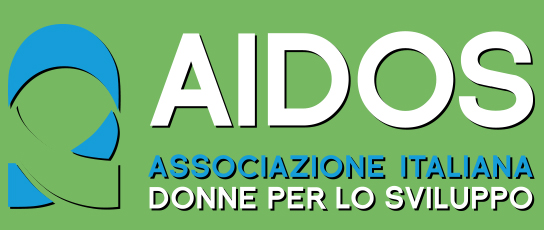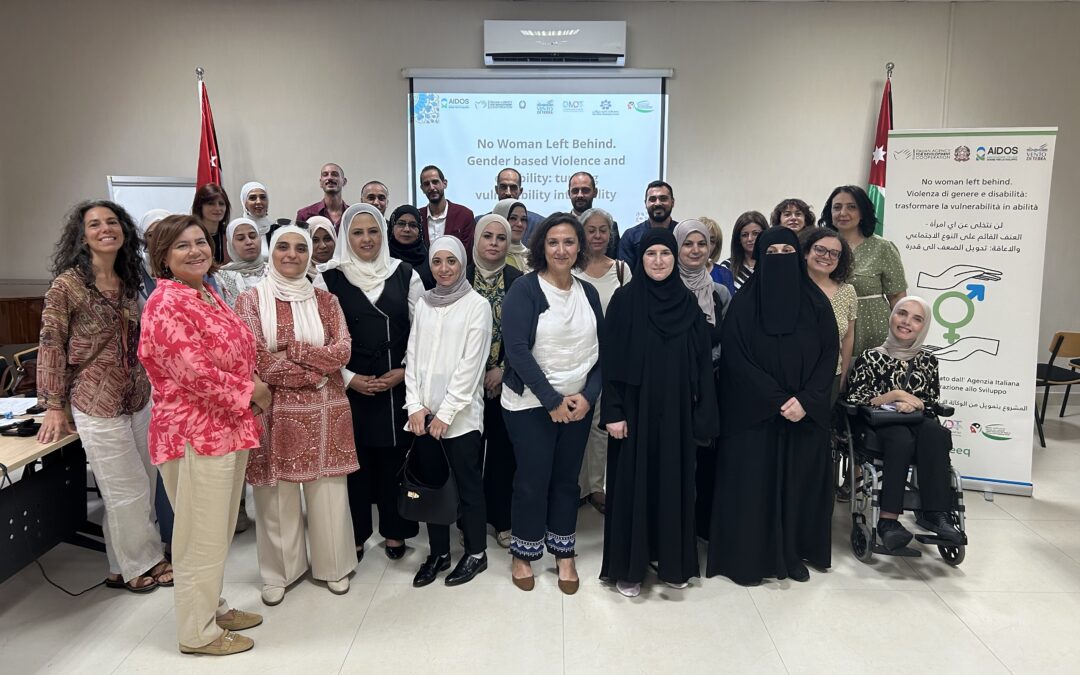At the end of July, we went to Amman for the closing event of our project on gender-based violence and disability. We applied an intersectional perspective to ensure that disability is also considered in confirmed cases of violence or in cases of women at risk, in an extremely delicate context.
According to the latest UNHCR data, updated to the 30th of June 2024, Jordan hosts 628.135 officially registered Syrian refugees. Just over 17% live in formal refugee camps, while the majority live in Jordanian host communities. This influx has created significant socio-economic pressure in the country, straining the government’s ability to guarantee primary services. As a result, there has been an increase in the percentage of the Jordanian and refugee population living below the poverty line. Women and girls have lost jobs and income opportunities and those who experience a situation of vulnerability, such as women with disabilities and Syrian refugees, are even more exposed to the risk of gender-based violence. Thus, our project aimed to concretely improve the quality of life of these women, both in urban areas and in informal settlements in the Governorates of Amman and Mafraq, where there is the largest number of refugees.
To tackle these challenges, we worked for the first time in shelters, increasing the awareness of those who work and live there but also of the institutions involved, to ensure an overall change in society starting by addressing gender-based violence in all its forms.
The project also included training courses aimed at addressing one of the causes that holds back or leads women back to conditions of oppression and violence, what is defined as economic violence. To escape gender-based violence and rebuild one’s life, material conditions are in fact fundamental and a path of empowerment is necessary for an effective and lasting autonomy. The courses were designed based on the Jordanian reality and in collaboration with partner associations, which helped us to understand the importance of creating entrepreneurial activities from home and materialize the possibility of sources of income. We have organized business management courses, increasing and strengthening professional skills, training courses in photography, sewing, cooking and cosmetology. At the end, technical kits for starting activities were distributed to start entrepreneurial activities, thus allowing the launch of a business in the shortest time possible.
The lives of the women involved in the project were profoundly impacted by these activities, and some participants wanted to share their experience. Among these, Hasna, a divorcee with two daughters, one of whom is disabled, who started working at a bakery and was able to provide for their needs all by herself. Roukeia, thanks to the training received, started her own bakery business together with her children. Others also welcomed us into their homes to personally show the usefulness of the training and the equipment received, such as Wahida and Fatima, two young Syrian refugees. After the divorce, Wahida was worried about the maintenance of her daughters and sons. Together with Fatima, her sister-in-law, she participated in our project trainings. “The cooking courses and the kits’ equipment to start our own business have allowed us to produce food at home and then sell it. Today, thanks to word of mouth, our neighbors, local schools and markets purchase our products. This way we manage to earn the money to cover all the expenses ourselves, even those for the medical care of one of my children. We are really happy and proud of what we are building and we hope to expand our business over time.”
On the 21st of July we organized the final event in Amman to present the results of the project. The women who participated, the partner associations, but also government representatives expressed their satisfaction with the results achieved: the improved accessibility of the shelters involved, the adoption of new guidelines on disability and gender violence and the participants’ strengthened autonomy and economic independence. The head of the Protection Department of the Ministry of Social Development, Imad Suheiba, also shared the Ministry’s satisfaction with the project’s results, underlining the importance of the training received by their staff on the new guidelines on disability and gender violence and on the protocol for shelters integrated with a disability perspective.
During the project, 1.568 people among Syrian refugees and Jordanian communities at risk or survivors of gender-based violence increased their awareness of gender-based violence and disability, of which 10% were men; 57 staff of government bodies and civil society associations were trained on the intersection between gender violence and disability, of which 19% were men; 2 shelter homes have been made accessible to people with disabilities.
The “No Woman left behind project. Gender Violence and Disability: Transforming Vulnerabilities into Skills” is carried out in partnership with Vento di Terra, two Jordanian NGOs Durrat al Manal for Development and Training and the Arab Women Organization and in collaboration with the Higher Council for the Rights of Persons with Disabilities and the Ministry of Social Development. The project is part of the AID 11731.03 emergency program financed by AICS Amman.

